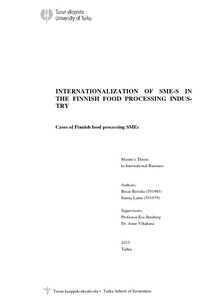Internationalization of SMEs in the Finnish Food Industry
Berisha, Besar; Lama, Sunny (2013-10)
Internationalization of SMEs in the Finnish Food Industry
Berisha, Besar
Lama, Sunny
(10 / 2013)
Julkaisun pysyvä osoite on:
https://urn.fi/URN:NBN:fi-fe201311207376
https://urn.fi/URN:NBN:fi-fe201311207376
Kuvaus
siirretty Doriasta
Tiivistelmä
Food industry in Finland has a long tradition and the new trends and the future of Finnish food industry is going towards functional and healthy food for the consumers in and outside Finland. Small companies operating in this industry face many difficulties in trying to compete and expand to new markets, that is why these companies are the key of innovation and they have done many breakthroughs in the food industry as well. It is therefore important to understand the internationalization process these companies follow and entry strategies they use, and moreover how they use their limited resources in order to be successful in international markets. This thesis via a case study approach deals with the issue of internationalization of SMEs and Finnish food industry.
This study supports earlier theories of internationalization, primarily the Uppsala model and acknowledges internationalization as an incremental process. Meaning that psychic distance is indeed the major barrier of internationalization, and acquisition of international knowledge requires significant amount of time which influences the level of resource-commitment in foreign markets. It follows that due to the risks involved in foreign markets, the least resource-intensive modes of market entry such as direct and indirect exports are generally preferred at the start of internationalization process. As of what explains the non-conventional rapid internationalization process, we conclude that in an internationalized industry and country with established trade flows like Finland, the context in which firms operate may be less significant than the varying level of entrepreneurial skills and confidence present therein.
This study supports earlier theories of internationalization, primarily the Uppsala model and acknowledges internationalization as an incremental process. Meaning that psychic distance is indeed the major barrier of internationalization, and acquisition of international knowledge requires significant amount of time which influences the level of resource-commitment in foreign markets. It follows that due to the risks involved in foreign markets, the least resource-intensive modes of market entry such as direct and indirect exports are generally preferred at the start of internationalization process. As of what explains the non-conventional rapid internationalization process, we conclude that in an internationalized industry and country with established trade flows like Finland, the context in which firms operate may be less significant than the varying level of entrepreneurial skills and confidence present therein.
